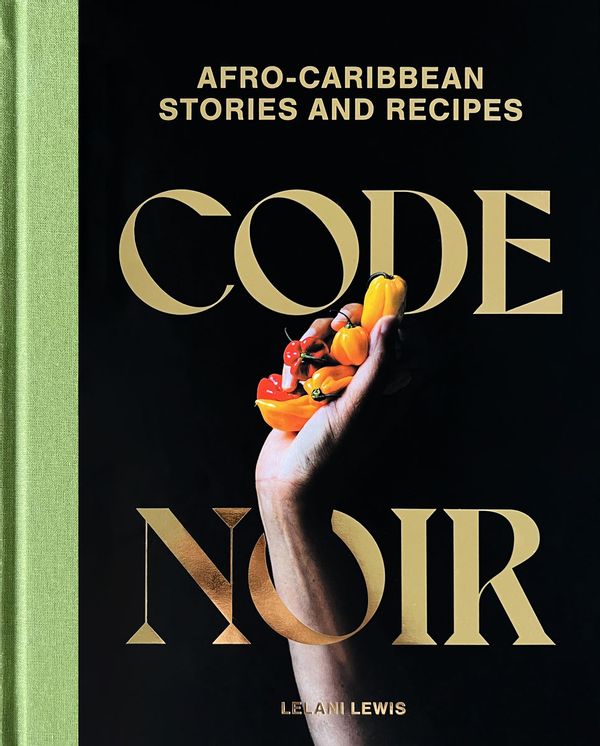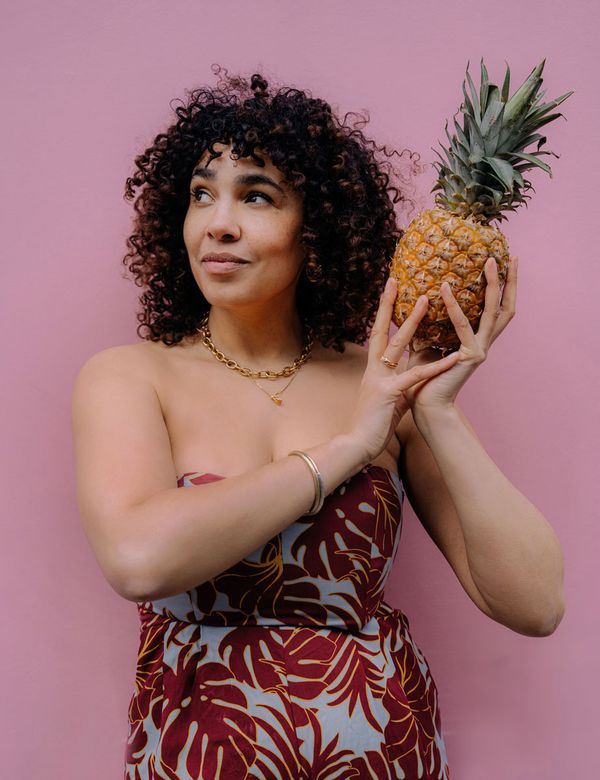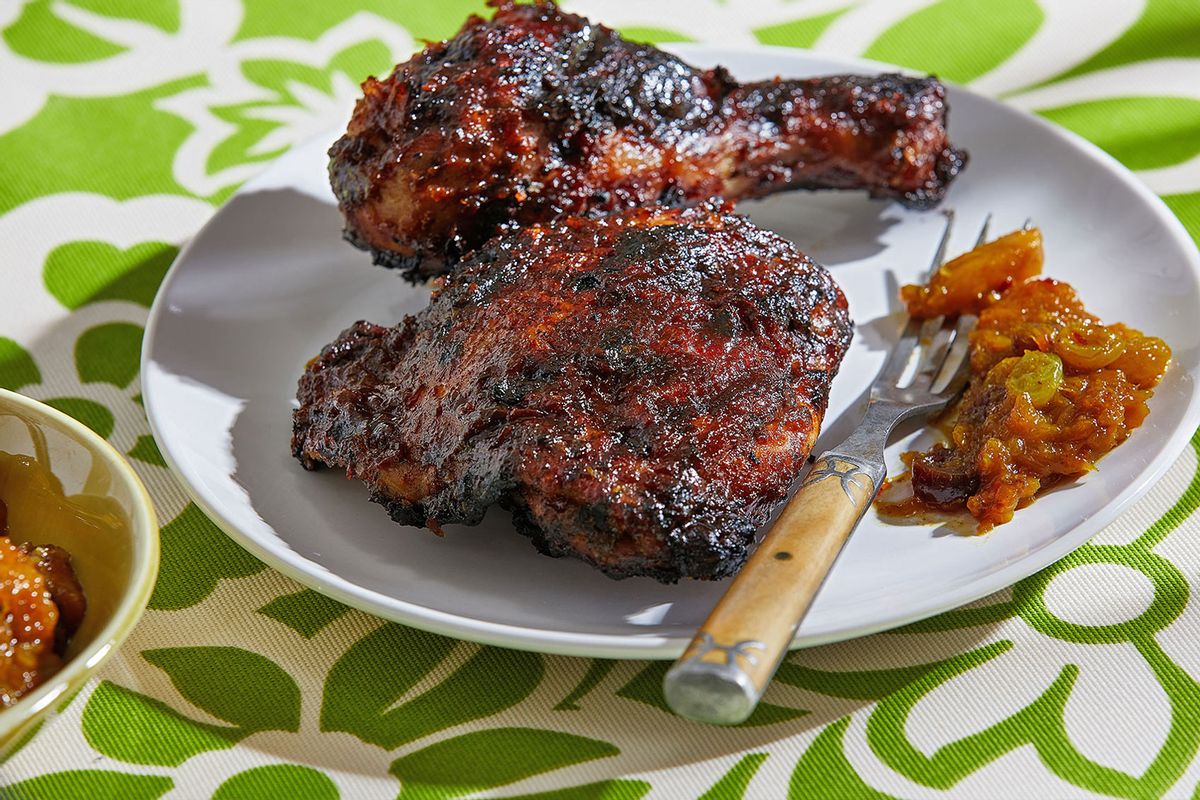Lelani Lewis’s “Code Noir” is so much more than just a cookbook. Full of stunningly colorful photos and amazing recipes, it also traces the plight of Afro-Caribbeans while simultaneously celebrating their culture, food and perseverance. “I would say that this book is equally a look at how food connects us rather than divides us,” Lewis said.
That desire to explore the way what we eat links us to other people and places has been a guiding ethos through Lewis’ career as a self-described culinary activist. After growing up in South London with a father from Grenada and a mother from Ireland, Lewis — who has a background as a chef and food stylist — began hosting dinner parties and workshops, also titled “Code Noir,” as a way to explore resistance and remembrance through food.
“Code Noir” is the name of a manuscript distributed by King Louis XIV that regulated the life, death, purchase, religion and treatment of enslaved people by their masters in all French colonies.
“My main point of interest was Caribbean food because of my own heritage,” Lewis said. “Lost and homesick in a new country, Amsterdam, I sought refuge in comfort food, which was the cuisine of my father. This pursuit, of not only the flavors but also why and how this food had came to be, was what brought me whilst researching, to the name Code Noir.”
 Code Noir by Lelani Lewis (Courtesy of Tra Publishing)
Code Noir by Lelani Lewis (Courtesy of Tra Publishing)
She continued: “Caribbean history is entwined in this dark past of exploitation and oppression, mostly for the pursuit of a cash crop that is sugar. It dawned on me that many of the foods we have consumed and still do, have major human and ecological costs and that we can not afford to consume without being conscious of what is on our plates.”
Lewis says that she is “a dreamer first and foremost, and then incredibly proactive,” and the development of her book follows that line of thought. After the success of her Code Noir dinners, Lewis came up with a pitch for her cookbook, largely to no avail. Eventually, she worked with Chef Joris Bijdendijk — who was owner of the restaurants Rijks, inside of the Rijksmuseum, and Wils in Amsterdam — and he connected her with his publisher.
“I knew he had a cookbook and very bravely or cheekily, I'll leave that assessment to you, said, 'I've always wanted my own cookbook,’” she said. “After having tasted my food, hearing my story and finally sending him the deck, he introduced me to his publisher — and the rest is history.”
Want more great food writing and recipes? Subscribe to Salon Food's newsletter, The Bite.
Lewis described working through the book, a 256-page tome containing both classic Caribbean recipes and new creations, as a form of catharsis.“I think the two disparate identities and cultures, especially the two that I came from, knowing that they had faced horrendous oppression and discrimination, bellowed a fire in me to fight even more so for social justice and equity,” she said.
She continued: “My dual identity and growing up in London exposed me to a plethora of flavors, tastes and cultures, which if anything grew my curiosity.”
According to Lewis, the book represents “the beauty of cultures and ingredients coming together and making something magical,” and the dish that most epitomizes this from “Code Noir” are the Trini Doubles. The dish is made from fluffy bara — and fried bread — topped with channa curry, made with green seasoning and a unique Caribbean curry powder, cucumber chutney, tamarind sauce and maybe some hot pepper sauce (“If you need the heat,” Lewis added).
"This street food is a perfect marriage between Indian food and flavors imported from Indentured workers and Caribbean ingredients, which has become synonymous with only the Caribbean,” she said.
 Lelani Lewis (Photo courtesy of Chantal Arnts)
Lelani Lewis (Photo courtesy of Chantal Arnts)
Lewis adores green seasoning — "because Caribbean food can swing between incredibly easy dishes and real labors of love" — which she says is excellent for boosting flavors in soups, stews, casseroles, marinades and dipping sauces, claiming it's "so damn simple but such a flavor bomb that it blows people away."
We need your help to stay independent
As far as her favorite dishes, she's partial to curry goat with rice and peas, coleslaw and fried plantain, which for her is "the epitome of home, one of the most comforting meals I make when I miss home and family." Lewis notes that although she doesn't like that "everyone associated Caribbean food with 'jerk,' it is a lovely marinade and cooking technique and also a great example of the marriage between two cultures creating something delicious." She's also fond of rice and peas as a "canon recipe," plus saltfish and ackee.
Lewis remarks that although certain ingredients might be trickier to source, practically every single one can be found in some capacity online, "but in the absence of that, you can always swap out ingredients. For example, if you can't get achiote, you could use tomato puree with smoked paprika, just trying to get as close to the flavor profile as possible."
“My singular message in this book is to focus on the things that connect us rather than divide us and I couldn't think of something more universal than food,” Lewis said. “So although I have written a book about Caribbean food and culture, which started as a way for me to reconcile my identity and duality, it finished with me spreading this unequivocal message of unity through food."



Shares